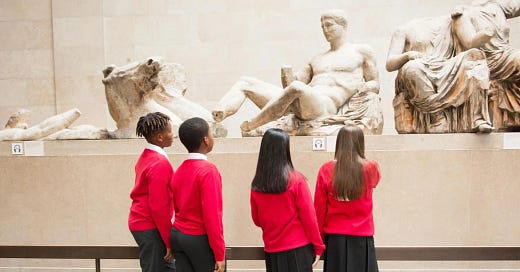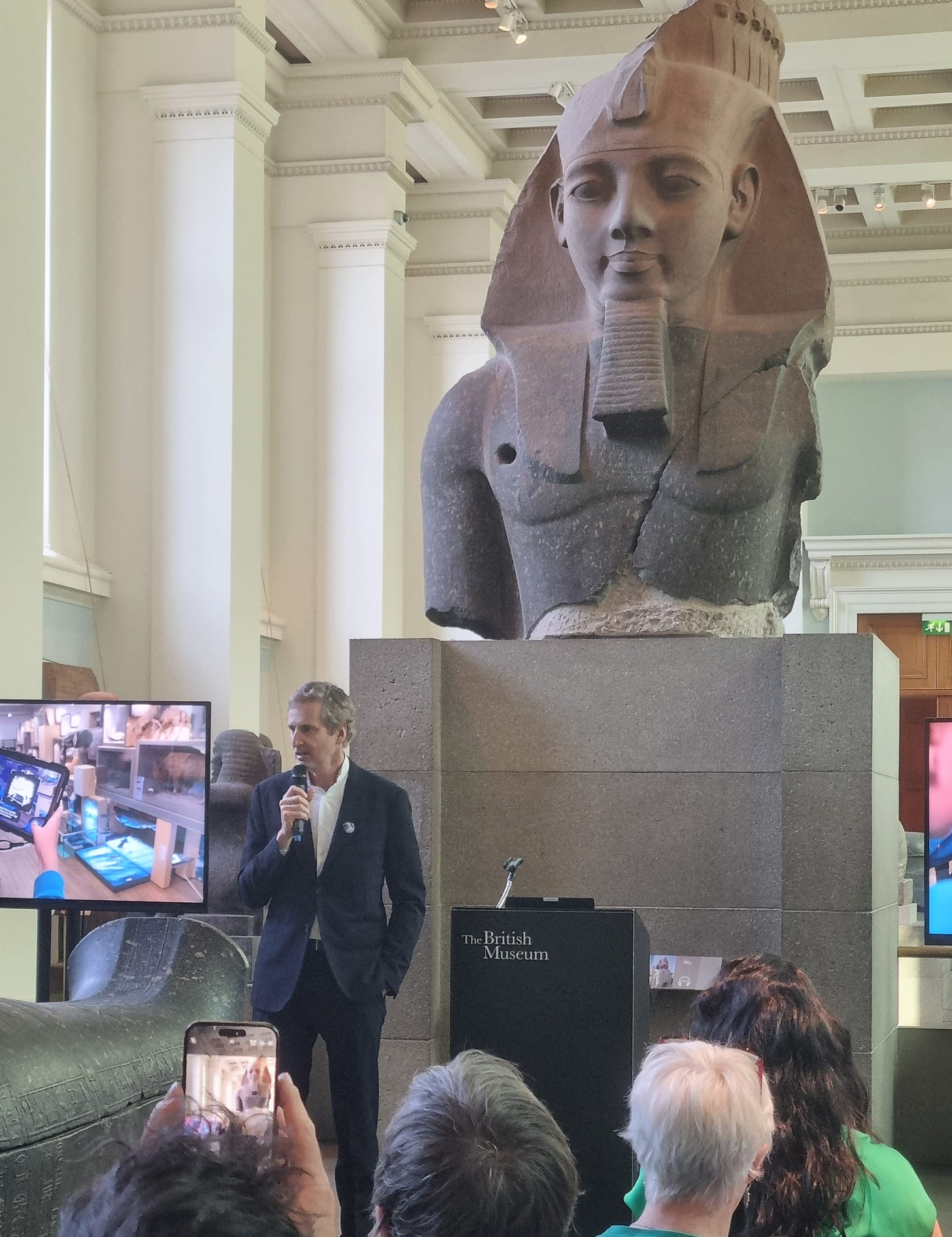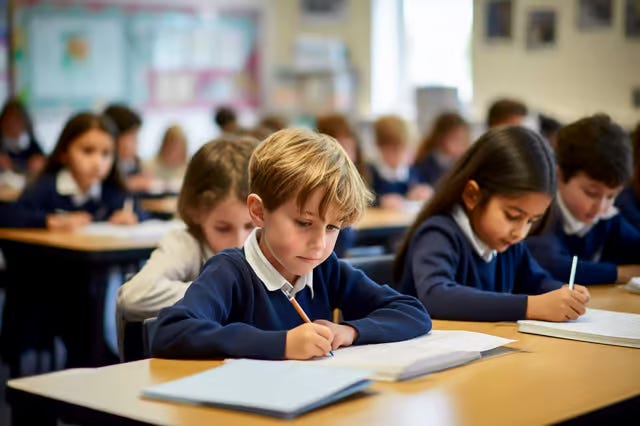Use any device necessary
How a French billionaire plans to get children into habitual museum-going
Billionaire Frederic Jousset stands beneath the colossal head of Rameses II in the British Museum and makes it clear to us assembled arts hacks that he is not just your everyday tech bro.
“Firstly, I am French,” he says. “As you can tell. And I live in London. My two children have British passports. But after I summited Everest, I thought I needed a new challenge…” Audible snorts from the hacks. Everest? Are you joking?
M. Jousset and Rameses II
Jousset has gathered us together for breakfast at the BM in order to share his latest big idea. His charity Art Explora, which is focused on museum access for under-represented groups, is launching a whizzy screen-based programme on hand-held devices, called Time Odyssey. The plan is that Time Odyssey will encourage children to see museums as a fun activity.
Jousset’s ambition is to enable every single British child to visit a museum before leaving primary school. I wish him well. To foster a life-long habit you have to start young. My first memory of museum-going? Queueing up at the age of 6 for the Tutankhamen blockbuster at the British Museum in 1972. I had museum-going parents. So, I was extremely lucky. Familiarity with museums when you are small breeds engagement for life, and most children acquire the habit through parental encouragement.
The current stats are depressing, and shameful. One only need venture into your nearest museum and see the average age of visitors, even at weekends. Clue: most people there will have taken O Levels, not GCSEs. Children simply are not customarily taken to museums. 60% of teachers have not taken their class to a museum on a school trip in the last year. 14% never have. Ever. Why? Usual stuff, pandemic, blah, cost, etc, staff time etc.
Those school trips you remember so well? Coach journeys to Roman villas; walking in a crocodile to the local history museum; picnics in front of Tate Britain. Workbooks. Projects. 20p to spend in the shop afterwards. Things not currently on the programme for many children.
The energetic Jousset has a response. Art Explora will not only foot the bill for 100,000 primary state school children to go to a museum (many ‘free’ museums outrageously charge for school trips), but it will also pay travel costs and supply Time Odyssey, an ‘immersive learning adventure’ once there. So; travel, entry and digital activity, all provided. Twelve museums, beside the BM, have already signed up.
“School trips offer enrichment that cannot be experienced in the classroom,” says M. Jousset. “This should be a fundamental right…not an optional extra.”
The dream
I fear that Jousset might find his new challenge significantly harder than traversing the Hillary Step. Plenty of well-meaning British organisations, including Kids in Museums and Children & the Arts, have also tried to do the same, with varying success. Here’s why.
The reality
1. The timetable
In order to take Class 3B to visit, say, South Shields Museum & Art Gallery, teachers must ensure that Class 3B isn’t going to fall drastically behind timetabled classes. Schools are grimly hanging on to the National Curriculum, which is under an almost constant regime of review and change, with tests every five minutes. Official requirements for pupils include a Reception Baseline Assessment, Key Stage 1 SATS, mandatory Key Stage 2 SATS plus phonics, times tables and Numerical Reasoning. Many primary school students aren’t literate when they go to secondary school; some cannot tell the time on an analogue clock. Ranged against these needs, the desire to take Class 3B out on a trip might pale somewhat.
2. The teachers
Small children don’t go to museums. Well, neither do teachers. “I’ll see you in two hours,” was the parting salvo from the teacher of Yellow Class when I helped Hanover Primary on a trip to the British Museum. It was up to us mummies and daddies to explain stuff around, er, the mummies.
3. The museums
The British Museum is great, and has interactive studios, a nice café with familiar food, and giant statues, and stories behind everything, and a huge staircase to run up and down. Not every regional museum is as well equipped and exciting. With piecemeal funding from cash-strapped local authorities, some have not changed their dusty display cabinets for years.
4. The children
Quotes from selected children in the Arts Explora press release were illuminating. “We got to explore the museum in a fun way, instead of the boring way,” was one. “It was my first experience at the museum, and I might not have the chance to come again”, was another. Hmm.
Let’s see how it goes. One thing Monsieur Jousset is not, is a quitter. His next idea? The world’s largest catamaran containing a floating museum, coming your way soon.








A national curriculum that doesn't include visiting museums and galleries belongd withr Gradgrind.
A good idea, but I can understand your scepticism about whether it will work, Rosie.
I’m heartened by how often my grandchildren visit museums with my adult children. I’ll be interested to see what kind of cultural trips will be on offer through school as they get older. I certainly hope it’s not a thing of the past.